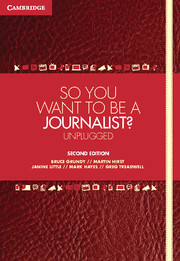Book contents
- Frontmatter
- Contents
- About the authors
- Preface to the second edition
- Acknowledgements
- Acknowledgements for the second edition
- Introduction Journalism unplugged
- Part 1 DISCOVERING JOURNALISM
- 1 Where is journalism headed?
- 2 How do you know it’s news?
- Part 2 FINDING AND UNDERSTANDING NEWS
- Part 3 NEWS-WRITING ACROSS THE GENRES
- Part 4 Legal and ethical issues
- References
- Index
1 - Where is journalism headed?
from Part 1 - DISCOVERING JOURNALISM
Published online by Cambridge University Press: 05 October 2012
- Frontmatter
- Contents
- About the authors
- Preface to the second edition
- Acknowledgements
- Acknowledgements for the second edition
- Introduction Journalism unplugged
- Part 1 DISCOVERING JOURNALISM
- 1 Where is journalism headed?
- 2 How do you know it’s news?
- Part 2 FINDING AND UNDERSTANDING NEWS
- Part 3 NEWS-WRITING ACROSS THE GENRES
- Part 4 Legal and ethical issues
- References
- Index
Summary
Chapter objectives
This chapter explores some issues about which beginning reporters might have questions, such as:
Whether journalism has a future in the age of user-generated content
Whether journalism is still essential to democracy
What kind of journalist you want to be
After reading the chapter, you should not only have a better idea about whether you want to be a journalist, you should also have a greater understanding of what it will take to succeed. Don’t be too worried if you find that you don’t want to be a reporter; everything you learn in a journalism course at university will provide you with valuable and transferable skills that are applicable in many professions and work situations.
In journalism, the ‘ism’ is more important than the ‘ist’. Journalism is a collection of practices that can be done by anyone – not just by a select few anointed by certain types of employers or degrees.
ireporter.org 2007One of the most confusing questions we get asked most days is: What does it mean to be a journalist today? Is journalism just ‘a collection of practices that can be done by anyone’? Even 10 years ago, this was not really a question; the ‘news 2.0’ tsunami had not really hit the newsroom yet, and journalism was something that journalists did on behalf of everyone else. There was the journalist inside the news organisation and the audience outside. But then a whole new DIY style began to emerge. It had its powerful moment of creation during protests against the ‘new world order’ in Seattle in 1999. Anti-capitalist protestors wanted to demonstrate at the World Trade Organization (WTO) summit, and they also felt that their message would not be reported accurately (if at all) by the mainstream media. So, instead of relying on the mainstream media, the activists decided to create their own global media: the Indymedia movement was born. In the decade since, we have seen the rise of so-called ‘citizen journalism’ and do-it-yourself broadcasting in the form of YouTube, blogs and now Twitter.
- Type
- Chapter
- Information
- So You Want To Be A Journalist?Unplugged, pp. 13 - 30Publisher: Cambridge University PressPrint publication year: 2012

